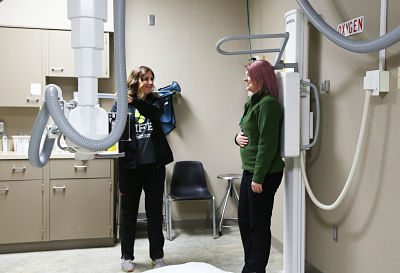
Radiology tech performing a scan on a femal patient.
Radiology
The goal of the Radiology Department at Republic County Hospital is to provide quality and caring diagnostic imaging services to the community we serve.
The Radiology Department offers routine and advanced imaging services. We utilize digital imaging which eliminates the need for film and expedites the process of your exam and results. With digital imaging your Physician can view your results via internet and consult with other Physicians and obtain second opinions in a much timelier manner.
The Radiology Department is staffed by six registered technologists and offers a full range of imaging services. Our exams are interpreted by a Board Certified Radiologist from the Plains Radiology Services out of Kearney, NE.
Some of the services we provide here at Republic County Hospital include:
Diagnostic Radiography
Diagnostic imaging is your conventional x-ray. We have a digital x-ray room, a digital portable x-ray machine, and a surgical C-Arm. Digital radiography is the top of the line technology in radiology. This technology brings an image directly onto a monitor straight from the imaging plate so there is no wait time required for processing films.
Exams that are offered include:
|
●All basic x-ray exams ●Sphenopalatine Ganglion Block ("SPGB" is a treatment for migraines) ●Epidural Injections |
●Small Bowel Follow Through ●Arthrograms ●Modified Barium Swallow |
Ultrasound
Ultrasound, also know as Sonography, is a way to obtain images within your body using high frequency sound waves. Sound waves are transmitted through the body and reflect back to produce a diagnostic real-time image.
Our highly qualified ultrasound technicians perform ultrasound on many ares of the body including:
|
●Abdomen ●Arterial ●Breast ●Cardiac (Echocardiography) ●Fluid Localization ●Obstetric ●3D Obstetric |
●Pelvic ●Renal ●Testicular ●Thyroid ●Ultrasound Guided Biopsy ●Vascular |
CT
Computed Tomography (also known as CT or CAT scanning) uses special equipment to obtain multiple cross-sectional images of the organs and tissues. CT produced images that are far more detailed than a regular x-ray.
Some of the CT exams that are offered include:
|
●Head ●Sinuses ●Chest ●Abdomen |
●Pelvis ●Spine ●Extremity ●Angiography |
Mammography
Mammography is the best available tool to screen for breast cancer. as part of our commitment to you , we offer digital mammography. Digital mammography minimizes the length of an exam by using specially designed digital detectors to produce an image that can be displayed on a hgh-resolution computer monitor. It eliminates the need for film processing, a time consuming practice that adds to the length of the patient's exam.
Our facility is accredited by the American College of Radiology (ACR). This gold seal of accreditation represents the highest level of image quality and patient care.
How often should you have a mammogram?
●(ACR recommends every woman have a yearly mammogram starting at age 40
●For women at increased risk for breast cancer, the ACR recommends yearly mammograms starting at age 30
Nuclear Medicine
Nuclear Medicine is a diagnostic procedure where very small amounts of radioactive materials are introduced into the body. These radioactive isotopes, or tracers, are attracted to specific organs, bones, or tissues, and are detected by a gamma camera which produces images based on the intensity of uptake from the isotopes.
Some Nuclear Medicine exams offered include:
|
●Bone Scan ●HIDA/CCK (gallbladder function test) ●Thyroid Uptake & Scan ●VQ Lung Scan |
●Renal ●Gastric Emptying ●Gated Blood Pool Scan ●Cardiolite Stress Test |
MRI
Magnetic Resonance Imaging (MRI) is a non-invasive imaging method that uses radio waves and a powerful magnetic field rather than x-rays to produce clear and detailed images of virtually any part of your body.
MRIs provide the ability to look at all the organs and soft tissue parts of your body to help diagnose illness or injury.
A technologist will interview you prior to entering the MRI room. This questioning is for your safety prior to entering this strong magnetic field. A complete list of questions will be asked such as surgical history, any metal in your clothes, removal of watches, credit cards, etc.
Exams conducted by MRI include:
●Head/Brain
●Extremity
●Spine
●Angiography

